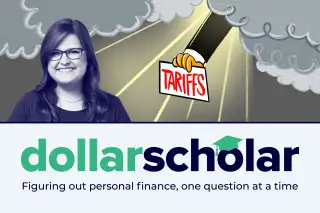Dollar Scholar Asks: Could Trump's Tariffs Actually Help Me Save Money?

This is an excerpt from Dollar Scholar, the Money newsletter where news editor Julia Glum teaches you the modern money lessons you NEED to know. Don't miss the next issue! Sign up at money.com/subscribe and join our community of 160,000+ Scholars.
In Money's Slack workspace, which dates back to 2019, the word "tariff" has been posted 557 times. All but 10 of those messages were shared in the past six months. (I counted.)
Tariffs have been the subject of a Saturday Night Live cold open and a Chinese TikTok trend. Car dealerships are running tariff-specific sales. Lately, the phrase "girl, the tariffs" has entered our collective lexicon in a way I haven't seen since "stimmy," being used as a reaction to everything from the Cowboy Carter tour to a cafe checkout error.
And while a lot of the discourse is, predictably, negative — per one analysis, the price level from all 2025 tariffs could cost the average household $4,700 per year — I can't stop thinking about how unusual this all is. Tariffs are a topic I learned about in eighth-grade U.S. history and fully believed I'd never encounter again. Now I'm 33 and overhearing people talk about them at bars.
Amid all the gloomy predictions and doomsday interviews, that has to be worth something, right?
Is there any silver lining to the ongoing tariff discussion?
Emily Barbe, a certified financial planner with Domain Money, tells me it can be hard to find a bright side when it comes to economic policy, which often feels theoretical until it very much isn't.
While I don't mean to gloss over any negative impacts — yes, layoffs and a recession could very well be on the horizon, as many experts are warning — there may indeed be upsides.
President Donald Trump has proposed these expanded tariffs, which are taxes on imported goods, as a way to incentivize manufacturing companies to return jobs to the U.S. Although it's unclear whether this will happen, there are some other pros to consider, according to Patti Brennan, president and CEO of Key Financial Inc. She says the tariff-motivated decisions by companies to move production stateside could improve national security, encourage the trades as a career path and strengthen U.S. supply chains.
Also, as corporations try to find ways to lower their inflated costs, they'll likely have to get creative, which "could lead to breakthroughs in automation, innovation and sustainability," Brennan says. Necessity is the mother of invention and all that.
"Yes, it's chaotic. Yes, it's scary. But if we can just take a deep breath, let's think about what might come out of all this," she adds.
Speaking broadly, the increased awareness itself is a silver lining, says Mary Clements Evans, a CFP and author of Emotionally Invested.
"We're human beings; we don't tend to pay attention to things until they affect us personally," she adds. "Everybody [is] finding out that politics matter, [that] trade policy matters, and these affect everyone."
When people's expenses go up, they tend to start paying more attention to their spending. For some folks, tariffs will mean cutting back on discretionary purchases and boosting their savings.
To a degree, this is already happening: A recent Redfin survey found that 24% of consumers said they're canceling plans to make a major purchase because of the tariffs. Another 32% said they're delaying those plans.
For others, the tariffs will lead to increased scrutiny.
Brennan suggests we could see people shift away from cheap, disposable items convenient in the short term toward durable, high-quality goods that will last longer.
I may start investigating where the stuff I buy comes from and being more choosy about the sources. (FYI: 60% of Walmart's imports are from China, and 25% of Nike shoes come from Vietnam.)
"There will be more conscious consumption," Brennan says. "Instead of wondering where your money is going, tell it where you want it to go."
This is likely to happen even if we're not in a recession — which, BTW, we're currently not. It's similar to how the moment I start purposefully tracking how much candy I eat, I start eating less candy.
Sure, it might be painful in the short term, but it's primed to benefit me in the long term. In fact, the price increases from the tariffs might just be the nudge I needed to get my financial house in order by beefing up my emergency fund, revisiting my budget, buying stocks (they're kind of on sale!) and more.
"When things are really good, it's very easy to not pay attention to our personal finances. It's very easy to just be on autopilot, swipe the credit card, pay for anything you want," Barbe says. "When there's a big shift, and when there's kind of doom and gloom on the horizon, whether it's true or not, it forces people to pay more attention."
The bottom line
People are focusing on trade policy in a way they haven't in years. Politics aside, if the tariffs make me pay closer attention to my spending, that's a good thing — it can help me save money and make sure I'm using my dollars to achieve my goals.
"Learning how the economy operates is tremendously valuable for everyone because everyone's a consumer," Clements Evans says.
More from Money:
How Should I Prepare for a Recession?
What Trump's New Tariff Announcements Could Mean for Your Wallet